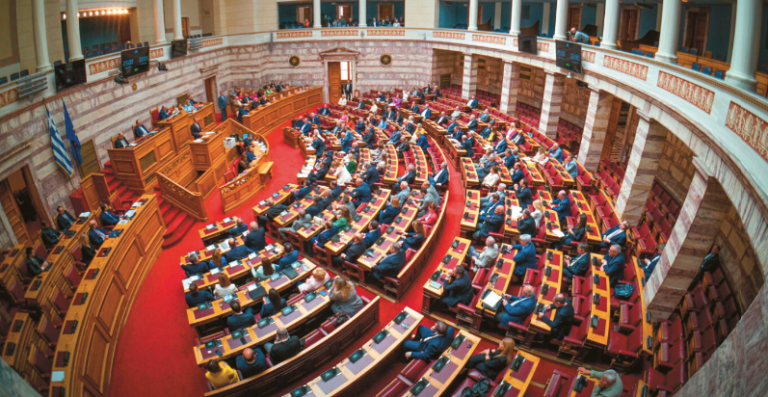Critical institutional changes to modernise the country’s top charter include the agenda to be presented by the ruling majority. Atypically, the process will be launched in the summer to enter parliament in early 2025. At the top of the ND’s proposals is the change of Article 16 for the establishment of non-state universities, the universal application of absentee voting in national elections as well, the possibility for the state to select executives for executive positions directly from the private market and the establishment of a fiscal cutter.
Postal voting
The government appears determined to propose the universal extension of the postal vote to apply to voters within and outside the territory and in all elections. Besides, the first conclusions from its implementation in the European elections are considered particularly positive by the leadership of the Ministry of Interior and by opposition parties that did not support this legislative initiative.
Kyriakos Mitsotakis gave the direction by saying in an interview on Parapolitika radio last Thursday that the government will submit a relevant regulation to Parliament, noting that Parliament will judge whether the use of the postal ballot for voters within the territory is compatible with the Constitution. However, according to the Constitution and the executive laws, the universal application of postal voting is currently only valid for European elections.
It may be extended to national elections by a law that will garner at least 200 votes, but only for Greeks abroad, as its use by domestic voters raises several constitutional concerns. If a constitutional amendment is eventually deemed necessary, the Maximou building is expected to propose changing the 4th paragraph of Article 51 of the Constitution to remove any obstacles.
Non-state universities
The revision of Article 16 is a proclaimed position of ND and Kyriakos Mitsotakis. In this context, the government took the first step last March by passing a bill allowing leading international universities to operate academic branches in Greece. However, the final solution for the establishment of non-state universities can only be found through a revision of the Constitution, provided, of course, that the necessary political consensus is secured.
The government appears optimistic that at least 180 MPs can be found in the current proposing parliament to give the green light for the article to be amended by a simple majority of 151 in the revision parliament that will emerge after the 2027 national elections. Of key importance will be the stance of PASOK, which has proven to be a more reliable factor in co-designing the necessary institutional changes than the regressive attitudes of SYRIZA.
Besides, Mr Nikos Androulakis has already set the conditions under which Char. Trikoupis could consent to the revision. However, a prerequisite for PASOK’s immediate positive stance is the presentation of the final provision by the government.
At the same time, the government is considering amending Article 103 in order to explicitly state the possibility of appointing executives from the private market to managerial positions in the public sector without requiring a specific justification. This was prompted by the recent rejection by the Council of State of relevant decisions on the selection of private individuals in the EFKA.
If this constitutional passage is amended, the government intends to extend the new targeted system of selection and evaluation of governors of state institutions and hospitals for the selection of executives in managerial positions in the narrow public sector, such as tax offices, ministries, etc. Article 79 is also expected to be included in the list of provisions proposed for revision towards the establishment of a fiscal cutter.
According to reports, the majority is oriented towards a wording that would state that the budget should ensure a fiscal balance between revenue and expenditure. In this way, the Court of Auditors could even cancel expenditure if it considers that it is diverting the Budget and the sustainable budgetary path.
Also on the government’s agenda is the revision of Article 24 to explicitly refer to the protection of water resources, the mandatory reforestation of public-private forests, and the enshrinement of environmental balance in every state intervention. Finally, the possibility of administrative fines being imposed by the criminal courts is being considered in order to avoid parallel proceedings in criminal and administrative courts.
Two steps
The revision of the Constitution will be carried out in two steps, with national elections in between. The first step concerns the current Parliament, which is the “proposing” one, and starts in early 2025, as this will mark 5 years since the completion of the previous revision (completed on 24/12/2019).
At the beginning of the new year, at least 50 MPs can submit a proposal identifying the provisions to be revised. Subsequently, the Speaker of the Parliament will set up a bipartisan Constitution Review Committee to examine all the proposals submitted and submit its report to the Plenary within a specific deadline.
Tension Building – The electoral race – Syntagma Campaign Rally – Reference to Tsipras
Then the sovereign parliamentary body will decide by two roll-call votes at least one month apart which of the proposed provisions will pass to the second round, which will take place after the national elections. A crucial element of the two phases, the “proposing” and “revising” parliaments, is the majorities that will be formed.
In particular, provisions that receive fewer than 151 votes in the proposing Parliament are rejected. Those that get at least 151 but less than 180 pass to the “Revisionist” House, but a majority of 180 is required to amend them. Provisions that exceed the 180 vote threshold in the current House can be revised in the next House by a simple majority of 151 votes.
Ask me anything
Explore related questions





